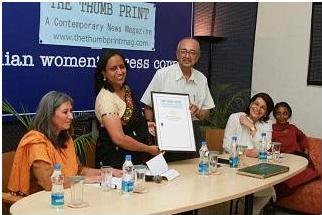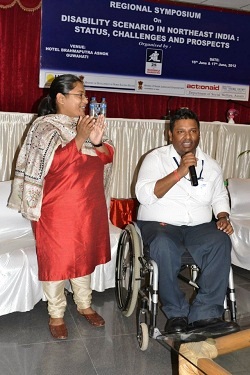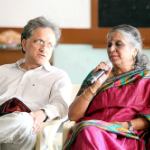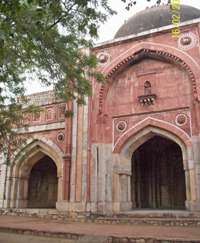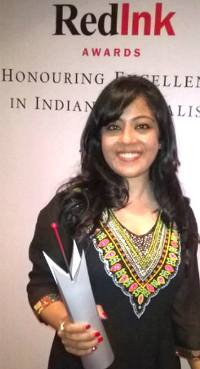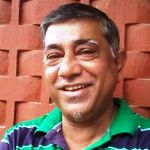Floodwaters ravage the remote island of Lamba Sapori (river island) in Assam's Dhemaji district as the monsoons rage. Trapped in their water logged home, Punyadhar and Tarali Morang are in dire distress. Their two-year child has had an acute asthmatic attack. There is little they can do but hope. Enter Boat Clinic "Shahnaz". On a return trip from a health camp, the boat spots villagers frantically waving at them to stop. Its health team swings to the rescue. Treated with adequate doses of sulbultamol, the child recovers within minutes. For the Morangs' the team is no less than godsend without whose timely intervention they would surely have lost their child.
Over a 100 kms downstream at Majuli's Maajor Sapori, 55-year-old Manik Saikia is a worried man. He has lost his home, his small vegetable patch and most of his livestock. His children are sick, It is the same story for Manik and his neighbours every monsoon, every year. It is not just the loss of land, the crops they lament about for that is anyway being eroded a little at a time, every day, in this largest river island, the cultural hub and centre of Vaishnavism in Assam. It is rather the loss of livestock, their only asset. This sense of displacement results in insecurity and mental health problems. Naturally alcoholism, depression and hopelessness abound in the islands with the people losing whatever little they own, year after year to the river. Post floods health problems are acute - many are affected by water-borne diseases. A major problem is access to medicines and sustained health care.
The Jorhat Boat Clinic "Nahar" and its health team met Saikia, his family comprising of an aged mother, his wife and two children at a relief centre. The children were attended to. Fever, diarrhoea, dysentery, ear and skin infections caused by prolonged exposure to river water, especially among children along with anaemia are common ailments during and post floods. Most are preventable- the health team gave them a lesson or two on maintaining personal hygiene, keeping themselves safe during floods, using mosquito nets at night and preparing a nutritious diet with locally available commodities, for most inhabitants are anaemic and extremely poor. Saikia and the villagers were happy to meet the team. The nearest sub-centre rarely offers them adequate health service, it is either unmanned or medicines are in short supply. They had a special request this time, they wanted the team to somehow arrange veterinary aid for their few remaining livestock - their cows and buffaloes as dear and precious and as much a part of their family. Animals display abnormal symptoms too during floods and the aftermath. The team assured them of conveying their message to the district administration and distributed the relief material which they had collected.
Plying along the mighty Brahmaputra which bisects Assam, sweeping along 724 kms of its territory, are the "Ships of Hope" in the "Valley of Floods" from Dhubri on Assam's south western border with Bangladesh to Tinsukia in the east. There are over 2.5 million people like Punyadhar, Tarali and Manik Saikia inhabiting the islands of the Brahmaputra. The Center for North East Studies and Policy Research' (C-NES) innovative health initiative supported by the National Rural Health Mission (NRHM) is aimed precisely at these vulnerable and marginalized communities. The Boats Clinics have a deep mission to fulfill -they bring health service that has not been available for decades to communities which are geographically, economically and socially excluded. The Boat Clinic concept won a World Bank Award for innovation aimed at bridging rural gaps. What was seen as a barrier- the Brahmaputra has been used as a lifeline, for there is no better way of reaching such areas than using the very resources that is blamed for their isolation: the river, through better designed boats. C-NES' Managing Trustee, eminent journalist and writer, Sanjoy Hazarika, who conceptualized the program says that the outreach is beyond his expectations. "We are delivering not just healthcare but enabling people to access their basic right to a better quality of life" says Hazarika. The effort has reached over 8 lakh persons today.
The focus: immunization of children, pregnant women as well as treatment of vulnerable adult groups. Ante natal checkups conducted are especially critical for a state like Assam which has the highest Maternal Mortality Rate (MMR) in the country at 390 per one lakh live deliveries. In 13 districts across the state, the boat clinics are reaching the poor and marginalized with sustained health care for the first time in their lives- many have not seen a doctor, a stethoscope or a syringe ever. At a Dhemaji Camp, an elated health team was informed by villagers that the first child in their village whose mother was under the team's supervision for her antenatal check ups was named "Doctor"- a good reflection of how much the teams have managed to penetrate and make their presence felt and appreciated. "Doctor Pegu" and his parents are regular visitors at the camps
"At times, we walk 10 km or more just to get to a village and hold a camp," said Medical Officer, Dr Bhaben Borah. "But the experience is enriching since the villagers see us as people who are bringing an improvement into their lives - this is visible from our many visits. It is exhausting work but also deeply fulfilling."
The teams are a committed lot. The Tinsukia Boat Clinic team was recently marooned in the surging Brahmaputra at the remote Amarpur sapori, bordering Arunachal Pradesh for six days with food and water shortage. They could neither move downstream and had to be later air lifted by an Air Force helicopter. Even in the midst of so much turmoil with even their lives at risk, the team continued providing medical services to people who came to the Boat Clinic in small country boats for all days. The villagers in turn brought food stuff for the team they were so fond of. The Boat Clinic was their friend, ever reliable.
ANM Rupali Dutta, seven months pregnant, part of the marooned team is determined to continue with her challenging work. She says "I will resume work soon after delivery. Since I am pregnant, I can understand how important regular checkups are for the mother and child. If we do not go, who will look after them? I ask new mothers to breast feed their child and to complete the routine immunization. It is worth the hard work"
Naturally villagers are happy. Says Mogen Missong, an elderly Mishing community leader from Dibrugarh's Aichung sapori, "Earlier we had to spend a whole day to even reach the nearest health centre."
The hard work has paid off. There has been a distinct change in attitude, with increasing numbers of young mothers with babies clinging to their backs coming to the immunization centers. Continuous visits and interactions by the health team with residents have created this transformation. Gone are the days when the very idea of an immunization team coming to their homes was met with suspicion. There are examples of women asking for family planning because they did not want more children since this could pose a danger to their health. At the close of camps, Medical Officers conduct an interactive session where they speak of the need for family planning, the importance of women's health and that of spacing children. Their audiences listen with rapt interest.
In Dibrugarh's Karmi Chuk sapori, 25-year-old Phaguni Payeng , married to a daily wage earner and a mother of three , lived in constant dread of pregnancy. Repeated childbirth has made her weak and anemic. She was unable to work in the fields to supplement the meager family income. Her life looked unbearably bleak until a neighbour told her about Boat Clinic health camps. The health team has since provided Phaguni with an awareness of and education on family planning methods. She was given iron tablets and a tip on a locally available "iron rich" food chart. The team convinced her about putting the children to school. Today an optimistic Phaguni asks fellow villagers to attend the camps and follow what the team has to say.
At a regular health camp at Jorhat's Kathsapori village, Padumi Bora is now the first to register her child for routine immunization. Just a year ago, the team had to counsel an initially reluctant Padumi to bring her infant daughter for immunization. She would just observe the camp from afar. Apprehensive about injections and doctors, she had not attended camps for ANC checkups even while she was pregnant.
It is not only during times of distress that the teams support the villagers. They are almost a part of each village home. During Bohag Bihu, the annual spring festival heralding the Assamese New Year, the teams join in the festivity- singing and dancing with the community. During Magh Bihu, the harvest festival, the teams are treated to special delicacies, kept aside for them. They join in Mising villagers during Ali Aye Irigang singing traditional Oinytom songs. Regular health clippings and awareness programmes are screened at night halt camps near the boat. The entertainment starved island dwellers flock the area- young and old. The Boat Clinic at Jorhat has started organizing art competitions for children dwelling around the Majuli islands- Baruah Chuk, Ghuria and Subidha sapori. Excited at getting color pencils, the initial hesitant children, soon open up to their creative best. They also perform traditional dances and sings at the group's request. They regret not being able to attend regular schools, given their physical isolation. Even where schools exist, most are in dilapidated conditions, teachers seldom take classes. That has not deterred most of them from aspiring, most aspire to become doctors naturally, the boat clinic doctors being the perfect role models to serve their community. Every time the teams leaves their sapori, the often repeated question is "akou ketia ahihbo?"(when do we see you next?)
The Boat Clinics have a more popular name - they are called the "Doctor's Boat" by the children of the islands. They run along with the boat from the riverbank, waving their hands in great anticipation as the boat passes by their sapori and continue doing so till it becomes a mere speck in the horizon. This time Boat Clinic Nahor making a visit to Maajor sapori again, has additional members, the veterinary doctors, as they have succeeded in convincing the administration about Manik Saikia's request. Hope floats on the Brahmaputra islands.
Find us on facebook: facebook.com/TheThumbPrintMag








